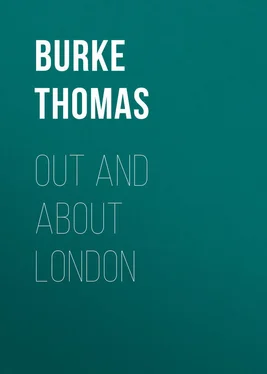Thomas Burke - Out and About London
Здесь есть возможность читать онлайн «Thomas Burke - Out and About London» — ознакомительный отрывок электронной книги совершенно бесплатно, а после прочтения отрывка купить полную версию. В некоторых случаях можно слушать аудио, скачать через торрент в формате fb2 и присутствует краткое содержание. Жанр: foreign_antique, foreign_prose, на английском языке. Описание произведения, (предисловие) а так же отзывы посетителей доступны на портале библиотеки ЛибКат.
- Название:Out and About London
- Автор:
- Жанр:
- Год:неизвестен
- ISBN:нет данных
- Рейтинг книги:5 / 5. Голосов: 1
-
Избранное:Добавить в избранное
- Отзывы:
-
Ваша оценка:
- 100
- 1
- 2
- 3
- 4
- 5
Out and About London: краткое содержание, описание и аннотация
Предлагаем к чтению аннотацию, описание, краткое содержание или предисловие (зависит от того, что написал сам автор книги «Out and About London»). Если вы не нашли необходимую информацию о книге — напишите в комментариях, мы постараемся отыскать её.
Out and About London — читать онлайн ознакомительный отрывок
Ниже представлен текст книги, разбитый по страницам. Система сохранения места последней прочитанной страницы, позволяет с удобством читать онлайн бесплатно книгу «Out and About London», без необходимости каждый раз заново искать на чём Вы остановились. Поставьте закладку, и сможете в любой момент перейти на страницу, на которой закончили чтение.
Интервал:
Закладка:
It had been a sorry experience, this round of visits, in 1917, to quarters last seen in 1914; and it made me curious to know how other familiar nooks had received the wanton assault of kings. In the haphazard sketches that follow I have tried to catch the external war-time atmosphere of a few of the old haunts, so far as a poor reporter may. Later, perhaps, a better hand than mine will discover for us the essential soul of London under siege; and these rough notes may be of some service, since all remembrance of that time was blown away from most minds by the maroons of Armistice Day.
BACK TO DOCKLAND
From my earliest perceiving moments, docks and railway stations have been, for me, the most romantic spots of the city in which I was born and bred. Quays and wharves, cuts, basins, reaches, steel tracks and passenger trains, and all that belonged to the life of the waterside and the railway, spoke to me of illimitable travel and distant, therefore desirable, things.
This feeling I share, I suppose, with millions of other men and children who have been reared in coast cities, and whose minds respond to the large invitations offered by sooty smoke-stacks or the dim outline of a station roof. And if these things pierced the complacence of one's days in the past, how much deeper and more significant their message in those four dreadful years, when men fared forth in ships and trains to new perils unimagined in the quieter years.
That apart, I see docks and railway stations not in their economic or historic aspect, but in the picturesque light, as, perhaps, the most emphatic glory of London. For London's major architectural beauties I care little. Abbeys, cathedrals, old churches, museums, leave me cold; the fine shudder about the shoulders I suffer most sharply before those haphazard wizardries of brick and iron flung together by the exigencies of modern commerce. Their fortuitous ugliness achieves a new beauty. A random eye-full of such townscapes may yield only an impression of squalor, but many acres of squalor produce, by their very vastness, something of the sublime. Belching chimneys, flaring furnaces, the solemn smell of wet coal mingled with that of tar and bilge-water, and the sight of brown sails and surly funnels and swinging cranes – in these misshapen masses I find that delight that others receive from contemplation of Salisbury Cathedral or a spire of Wren's.
The docks of London lie closely in a group – Wapping, Shadwell, Rotherhithe, Poplar, Limehouse, Isle of Dogs, Blackwall, and North Woolwich, and each possesses its own fine-flavoured character. You may know at once, without other evidence than that afforded by the sense of smell, whether you stand in London Docks, Surrey Commercial Docks, West India Docks, Millwall Docks, or Victoria and Albert Docks. To me, the West and East India Docks are soaked in the bright odour and placid clamour of the East, with something of feminine allure in the quality of their appeal. Victoria and Albert Docks I find gaunt and colourless. Surrey Commercial Docks remind me of some coarse merchant from the Royal Exchange, stupidly vulgar in speech, clothes and character.
The East and West India Docks I have treated elsewhere. Of the others, the most exciting are Millwall and London Docks – though of the latter I fear one must now speak in the past tense. Shadwell High Street and St. George's, which border the London Docks, are no longer themselves. All is now charged with gloom, broken only by the anæmic lights of a few miserable mission-halls and coffee-bars for the use of Scandinavian seamen. Awhile back, before this monstrous jest of war, there was a certain raw gaiety about the place brought thither by these same blond vikings; but, since the frenetic agitations of certain timorous people against "all aliens" – as though none but an alien can be a spy – these men are not now allowed to land from their boats, and Shadwell is the poorer of a touch of colour. One might often meet them and fraternize with them in the coffee-bars and beer-shops (there are few "public-houses" in these streets), and hear their view of things. Bearded giants they were, absurdly out of the picture in these tiny, sawdusted rooms, against the hideous bedizenment of the London house of refreshment. They would engage in rich, confused, interminable conversations, using a language which, to the stranger, sounded like a medley of hiccoughs and snorts; and there would be vehement arguments and a large fanning of the breeze. In the upper rooms, on Saturday evenings, one might have singing and dancing to a cracked piano and a superannuated banjo, and there the girls of the quarter would appear, and would do themselves well on seafarers' hospitality.
But the free-and-easy atmosphere is gone. You enter any bar and are at once under a cloud. Suspicion has been bred in all these docks men by the cheap Press. The patriotic stevedores regard you as a disguised alien. The landlord wonders whether you are one of those blasted newspaper men or are from the Yard. The visitors to the bars are in every case insipid; none of the ripe character that once lit such places to sudden life. Abrupt acquaintance and casual conversation are not to be had. The beer is filthy. The good Burton is gone, and in its place you have a foul concoction which has not the mellowing effect of honest British beer or the exhilarating effect of the light continental brews. Shadwell High Street is now a dirty lane of poor lodging-houses, foul courts, waste tracts of land, mission halls exuding a stale air of diseased hospitality, and those nondescript establishments, ships' chandlers, with their miscellanies of apparently useless lumber, stored in such a heap that it would seem impossible to find any article immediately required. In short, social life here is as it should be, according to the unwearied in war-work.
Still, there are some adorable morsels of domestic architecture to be found up narrow alleys: old cottages and tumbling buildings, mellowed by centuries of association with many weathers and with men and ships from the green and golden seas that lie beyond the muddy waters of London River; and these supply one touch of animation to the prevailing moribundity.
Very different are the Millwall Docks. Little material beauty here, but something much better – good company, and plenty of it. The docks lie at the south of the Isle of Dogs, amid a flat stretch of dreary warehouses and factories, and you approach them by a long curving street of poor cottages and "general" shops. The island is a place of harsh discords, for Cubitt's works are established here, and the ring of hammers rises above the roar of furnaces, and the vociferous life of the canals above the scream of the siren and the moan of the hooter, and the concerted voices of the island seem to cry the accumulated agony of the East End. Great arc lights, suspended from above, when cargoes are being unloaded by night, fling into sudden illumination or shadow the faces and figures of the groups of workers as they stagger up the gangways with their loads, and lend to the whole scene an air of theatrical illusion. In the bars you find sweaty engineers and grimy stokers. Here is a prolific field of character; mostly British, though a few Lascars may be found, drinking solitary drinks or parading the streets with their customary air of bewilderment. Here are nut-brown toilers of the sea, whose complexions suggest that they have been trapped by that advertiser in the popular Press who offers his toilet wares with the oracular pronouncement that "Handsome Men Are Slightly Sunburnt." Here are men who have circled the seven seas. Here, calm and taciturn, is a man who knows Pitcairn Islanders to speak to; who produces from one pocket a carved ivory god, presented to him by some native of Java, and from the other Old Timothy's One-Horse Snip for the Big Race.
Читать дальшеИнтервал:
Закладка:
Похожие книги на «Out and About London»
Представляем Вашему вниманию похожие книги на «Out and About London» списком для выбора. Мы отобрали схожую по названию и смыслу литературу в надежде предоставить читателям больше вариантов отыскать новые, интересные, ещё непрочитанные произведения.
Обсуждение, отзывы о книге «Out and About London» и просто собственные мнения читателей. Оставьте ваши комментарии, напишите, что Вы думаете о произведении, его смысле или главных героях. Укажите что конкретно понравилось, а что нет, и почему Вы так считаете.












